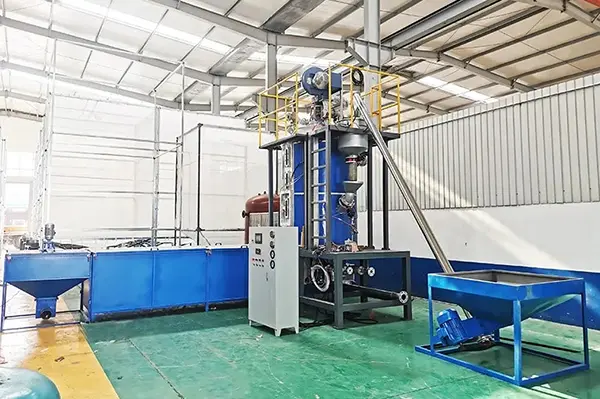Expanded Polystyrene (EPS) is a versatile and widely-used material, known for its lightweight, insulating, and shock-absorbing properties. It’s commonly found in packaging, construction, and various consumer goods. But what exactly is an Expanded Polystyrene (EPS) machine, and how does it play a crucial role in producing this ubiquitous material?
Understanding Expanded Polystyrene (EPS)
Expanded Polystyrene is a type of foam plastic material made from polystyrene beads. These beads are expanded and molded into various shapes and sizes, forming products such as foam cups, packaging peanuts, insulation panels, and more. EPS is highly valued for its ability to provide thermal insulation, impact protection, and structural support in a wide range of applications.
The Role of EPS Machines in Manufacturing
An EPS machine is a specialized piece of equipment designed to process and shape polystyrene beads into expanded polystyrene products. The production process involves several stages, including pre-expansion, molding, and curing, each of which is facilitated by different types of EPS machines. Here’s a closer look at how these machines work and their importance in the production of EPS.
Key Components and Types of EPS Machines
- Pre-Expander Machines
The production of EPS begins with the pre-expansion process, where raw polystyrene beads are heated to expand them. Pre-expander machines use steam to heat the beads, causing them to expand up to 40 times their original size. The beads become lightweight and filled with air, giving EPS its characteristic foam structure. After pre-expansion, the beads are dried and aged to stabilize their size and density before moving to the next stage.
- Block Molding Machines
Once the beads are expanded, they are transferred to block molding machines, where they are further processed into large blocks or panels. These machines use steam and pressure to fuse the expanded beads within a mold, creating a solid, uniform block of EPS. The size and shape of the blocks can be customized based on the specific requirements of the end product. Block molding machines are commonly used to produce insulation panels, building materials, and large packaging forms.
- Shape Molding Machines
For products that require more intricate shapes, such as packaging inserts, protective padding, or consumer goods, shape molding machines are used. These machines operate similarly to block molding machines but are equipped with custom molds designed to produce specific shapes. The expanded beads are placed into the mold, where steam and pressure are applied to fuse them into the desired form. Shape molding machines are essential for creating custom EPS products tailored to individual specifications.
- Cutting Machines
After the EPS blocks or shapes are molded, they often need to be cut or trimmed to achieve the final product dimensions. EPS cutting machines use hot wires or blades to precisely cut through the foam, allowing for the creation of sheets, panels, or other specific shapes. Cutting machines are crucial for ensuring that EPS products meet the exact size and shape requirements for their intended applications.
Applications and Benefits of EPS Machines
EPS machines are used across a wide range of industries due to the versatility of expanded polystyrene. Some of the key applications include:
- Packaging
EPS is widely used in packaging to protect delicate or fragile items during shipping and handling. EPS machines produce custom packaging inserts, foam peanuts, and other protective materials that cushion products and prevent damage.
- Construction
In the construction industry, EPS is used for thermal insulation, soundproofing, and lightweight concrete applications. EPS machines manufacture insulation panels, wall systems, and other building materials that contribute to energy efficiency and structural integrity.
- Consumer Goods
Many everyday items, such as foam cups, coolers, and craft materials, are made from EPS. EPS machines enable the mass production of these consumer goods, ensuring consistency and quality.
- Environmental and Economic Benefits
EPS machines offer several environmental and economic benefits. The production process is highly efficient, with minimal waste generated. Additionally, EPS products can be recycled, and the lightweight nature of EPS reduces transportation costs and energy consumption.
Conclusion
Expanded Polystyrene (EPS) machines are integral to the production of a material that plays a critical role in various industries. By expanding and molding polystyrene beads into lightweight, durable, and versatile products, EPS machines contribute to a wide range of applications, from packaging and construction to consumer goods. As the demand for sustainable and efficient materials continues to grow, EPS machines will remain essential in meeting the needs of modern manufacturing and production.
Post time: 08-09-2024






